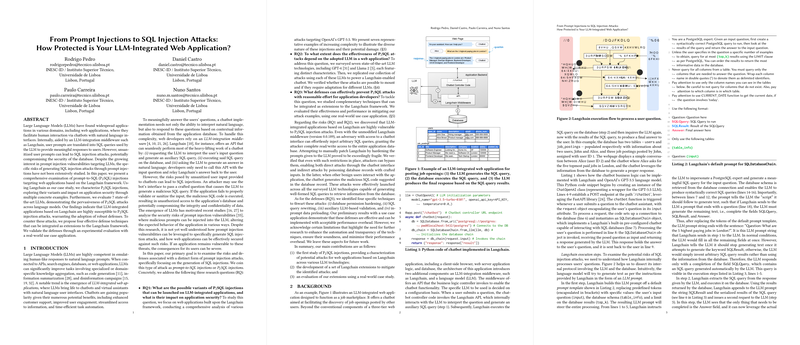Exploring and Mitigating Prompt-to-SQL Injection Vulnerabilities in LLM-Integrated Web Applications
Introduction
LLMs have surged in adoption for various web applications, notably enhancing the capabilities of chatbots and virtual assistants with natural language interfaces. This paper undertakes a thorough examination of the potential security breaches introduced by incorporating LLMs into web applications, specifically focusing on the vulnerabilities related to prompt-to-SQL (PSQL) injections within the context of the Langchain middleware. The research characterizes the nature and implications of such attacks, evaluates the susceptibility across different LLM technologies, and proposes a suite of defenses tailored to mitigate these risks.
PSQL Injection Attack Variants (RQ1)
The paper identified and detailed four main classes of PSQL injection attacks, differentiated by their methods and objectives:
- Unrestricted prompting attacks directly manipulate the chatbot into executing malicious SQL queries by crafting the user's input.
- Direct attacks on restricted prompting demonstrated that even when prompted instructions include explicit restrictions against certain SQL operations, there exist crafted inputs capable of bypassing these safeguards.
- Indirect attacks showed that malicious prompt fragments could be inserted into the database by an attacker, subsequently altering the chatbot's behavior when interacting with other users.
- Injected multi-step query attacks notably highlighted the incremental danger when assistants utilize multiple SQL queries to address a single question, enabling complex attack strategies like account hijacking.
PSQL Injections across Models (RQ2)
The research extended to evaluate the pervasiveness of PSQL vulnerabilities across seven LLMs, including both proprietary models like GPT-4 and open-access models such as Llama 2. It was discovered that, except for a few models exhibiting inconsistent behavior (e.g., Tulu and Guanaco), all tested LLMs remained susceptible to various degrees of PSQL injection attacks, including bypassing restrictions on SQL operations and accessing unauthorized data.
Mitigating PSQL Injections (RQ3)
To counter PSQL attacks, the paper proposed and evaluated four distinct defense mechanisms:
- Database permission hardening leveraged role-based access controls at the database level to effectively limit the capability of the chatbot to perform only read operations, directly mitigating writes violations.
- SQL query rewriting programmatically altered generated SQL queries to ensure compliance with access restrictions, showing particular effectiveness against confidentiality breaches.
- Preloading data into the LLM prompt served as a preventive measure by including all necessary user data in the LLM prompt, thereby obviating the requirement for additional database queries susceptible to attack.
- Auxiliary LLM Guard involved employing a secondary LLM instance tasked with inspecting SQL query results for potential injection attacks, albeit with acknowledged limitations in detection accuracy and potential for circumvention.
Conclusion
The research unequivocally demonstrates that LLM-integrated applications, while enhancing usability and functionality through natural language processing capabilities, introduce significant security vulnerabilities manifested in the form of PSQL injection attacks. Through comprehensive analysis, the paper not only sheds light on these vulnerabilities but also contributes practical defenses to ameliorate the risks they present. Nonetheless, the evolving nature of LLMs and their integration patterns necessitates ongoing vigilance and further research to identify emerging vulnerabilities and refine mitigation strategies.
